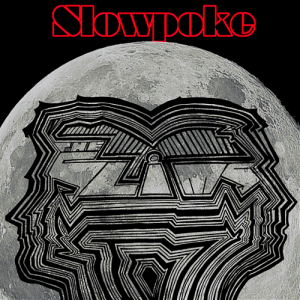From The Horse's Mouth: Travis Atria and Collin Whitlock (The Slims) on Slowpoke
The Slims are a soul duo from Gainesville, Florida. Slowpoke, their second album, is full of rhythmic, sensual, no-nonsense slow jams. All instruments except violin were played, recorded, produced and mixed by Morningbell’s Travis Atria (a.k.a. Jackie Slim, a.k.a. James Brawn, a.k.a. Jimba Lushi), and another of Gainesville’s most accomplished musicians, Collin Whitlock (a.k.a. Jimmy Slim, a.k.a. Merlin Brando, a.k.a. Jamba Lushi).
Atria and Whitlock began writing the album during the recording process for Morningbell’s Boa Noite, which was released to critical acclaim in May of this year. Slowpoke sees the band carving out their own sound, drawing less heavily on classic soul influences than their previous work, while still containing the seeds of Al Green, Marvin Gaye, Teddy Pendergrass, Gil Scott-Heron, and much more. Slowpoke also carries on the storyline from 2010’s concept double-album Killa Dilla while making allusions to the Slims’ next project hidden within the lyrics.
Slowpoke is a true collaboration between two of the Southeast’s most prolific and inventive musicians. It is aimed at the body as well as the mind. There haven’t been two white boys this sexy since Hall & Oates.
Ghettoblaster recently caught up with the sexy duo to discuss the record, which drops on September 24, and this is what they told us.
When did you begin writing the material for Slowpoke?
Collin: I think we starting laying down the foundations about two years ago, although the concept came long before that. Travis and I have desired to create a sensual album like this for a long time.
Travis: We started about two years ago, when I was in the middle of making the Boa Noite album with Morningbell. I had this idea to go to the music library at the University of Florida and just spend some time picking out weird records from their stacks and listening to them on the turntables that they provide. It’s one of the great things about living so close to a public university, anyone can go in and take advantage of these things, but I feel like most people don’t ever even think about it.
During that process, we found a bunch of really weird stuff that we liked, including this record of Hungarian folk music, which I also ended up sampling on the Morningbell album. So, those weird voices you hear at the beginning of the first song on “Slowpoke” came from that. After making the first Slims album, I knew that I wanted us to go in the direction of slow jams, because I feel like that’s an area very few musicians are exploring. So, we sampled those weird voices and then we just came up with the rest of that first song.
We probably wrote all of the music for the album in the space of a couple weeks, but I was busy finishing “Boa Noite” and couldn’t really focus on anything else so the songs just sat there for a while.
What was the most difficult song to take from the initial writing stage through recording and mixing? Why was it so troublesome?
Travis: Honestly, I feel like most of these songs came pretty easily. The most trouble we had, I think, was with filling out the B side, because we knew we wanted an upbeat song to happen right before the end, but it took us a little while to figure out what that song was going to be. It ended up being “Oh My God, Yes I Do.” Usually, when you put me and Collin in a room together, it won’t take us too long to come up with something nice.
Collin: I think the song with which we had the hardest time grasping was “Ashes Under the Rug”. We knew from the start that we had a beautiful melody in front of us, but it was difficult to figure out what to add or subtract from it to make it right. But really, every song has its own frustrations.
For the most part, all of these songs came together pretty organically piece by piece. Trying to write an entire song all at once is a mistake, or at least, it doesn’t work very well for us. Instead, we take a concept or a mood we’d like to capture and we start from the ground up. Little by little we push our songs towards completion, adding bits here and omitting bits there, and over the course of many months the music begins to take on personalities of its own. After that, it’s just a matter of polishing the rough edges and making a finished product.
Which of the songs on Slowpoke is most different from your original concept for the song?
Travis: We’re pretty good at identifying what we want the songs to be and then executing that vision. That being said, I think there are definitely moments that turned out extra special. When “Only A Part, Not The Whole” kicks into the slow part, I think that just really hit the nail on the head more than we could’ve hoped. Also, I think the song “Tastemaker” turned out incredibly sexy and sensual, even though it’s really a nasty song about Pitchfork.
Collin: All the songs match the original concept, but the songs’ melodies and soundscapes changed numerous times throughout the recording process. Since we started writing this album, we’ve made hundreds of versions of the nine final tracks. Each iteration has some elements of the others intertwined within, but ultimately, they had to be whittled down into the final product on the track list.
Did you have any guest musicians play or sing on the record?
Travis: We have a guy named Andrew Cook playing violin, and Collin’s fiancee Jess singing backup with a friend of ours named Sam Jones. Otherwise, we do every part ourselves.
Who produced the record? What input did that person have that changed the face of the record?
Collin: Travis and I produced it.
Travis: We produce, engineer, write, and perform everything ourselves except for the people I just mentioned. I have a studio in my house called “The Experimentorium,” and a lot of music comes from it, including all the Morningbell albums and both Slims albums.
Is there an overarching concept behind your new album that ties the record together?
Travis: Our first album was a double-concept-album following the rise and fall of a fictional soul singer named Snooky Green. At one point in the storyline for that album, which is called Killa Dilla, He cheats on his woman, and things start to go wrong. “Slowpoke” follows the story of Snooky’s woman, who goes to another man and tries to seduce him. The album is told from the point of view of the other man, who just might show up in the next Slims album.
Collin: Yes. There are certain aspects of the concept that we’d like to leave up for speculation. That being said, there are certain connections that I doubt anyone would be able to make, so I’m fine with sharing that.
Our last album, Killa Dilla, was the story of the rise and fall (life and death) of a fictional soul singer named Snooky Green. At one point during Snooky’s rise to fame, he fell madly in love and was happy. He didn’t know it, but he’d already reached the top. Unfortunately, as with many people in his position, he didn’t realize what he had. Eventually he gave in to temptation and betrayed his true love, thus providing the catalyst for his eventual downfall.
Slowpoke picks up at that moment, when the woman who Snooky betrayed runs back into the arms of a former lover with whom she hopes to find comfort. In Killa Dilla, we attempted to tell a story that spanned many years of a particular character’s life. Slowpoke, however, is a story that lasts just one night. In addition, within Slowpoke there is an allusion to The Slims’ upcoming album, Spacewolf.
Have you begun playing these songs live and which songs have elicited the strongest reaction from your fans?
Travis: We have, but it’s hard to tell because the songs are so new. I think “Ain’t No Rush” gets people going, and we do a pretty damn good job of “She’s Talking A Blue Streak Now, Jack.”
Collin: We’ve only just recently started playing the songs live. I think the song that got the best response was “She’s Talkin a Blue Streak Now, Jack,” although I think the crowd really dug “Only a Part, Not the Whole” paired with “Ain’t No Rush.”










Social Media